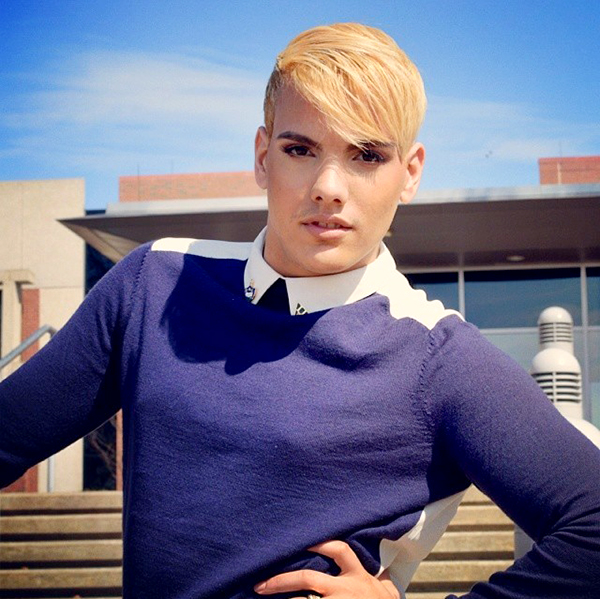Expanding Access and Equity in the Dance Profession
MARK TRAVIS RIVERA, founder of marked dance project and an award-winning activist, choreographer, dancer, speaker and writer, shares his perspective on what makes a professional dancer and how his intersectionality being Latino, gay, gender non-conforming (femme) and disabled informs his point of view. His responses are part of a larger series dissecting what it means to be a professional dancer. To read other perspectives on the topic, click here.
~~
What does your current regular dance practice look like?
Currently, my regular dance practice consists of running rehearsals for my dance company, marked dance project. In addition, I teach masterclasses throughout the region.
Would you call yourself a professional dancer?
As a disabled dancer, I struggled to call myself a professional dancer for a long time but I no longer feel that way. I would call myself a professional dancer-choreographer because I have put in the time to learn the craft and make a contribution to the field of dance throughout my work.
What do you believe is necessary for a dancer to call themselves professional? Is part of being a professional getting paid?
I think people need to first believe in themselves and their worth as an artist. While being paid is ideal and one indicator of being a professional, it alone is not enough to call oneself a dancer. I believe training, taking class, teaching class, learning about dance history, etc. make up the alchemy of a professional dancer.
Is there a certain amount of training involved in becoming a professional dancer?
Absolutely! But one must also take into account the socio-economic barriers that get in the way of someone training in the field of dance. One must consider class, race and disability issues when they try to project what “makes a professional dancer, a professional dancer.” For me personally, my dance training didn’t start until I was 15 years old, which by some people’s standards would mean that I didn’t train enough to call myself a professional dancer.
Do you consider project-based work to be professional?
Yes, I do, because creating art is work, regardless of the length of time you spend working on it.
Do you consider solo work to be professional?
The most daring thing a dancer can do is create for oneself, to be an entrepreneur and develop works that resonate for them.
Do you think the definition of a professional dancer is different than it was 25 or 50 years ago? If so, do you have any ideas why it might have changed?
I sure hope so! As a disabled dancer/choreographer, the field of integrated dance (the inclusion of disabled artists in the field of dance) has dramatically shifted in the past five years. Funders and presenters are seeing the artistic value and rigor of integrated dance and, by doing so, are redefining what it means to be a dancer. A professional dancer can be anyone who puts in the time and energy to learn about the craft, its techniques, and history of the field.
The perception of a professional dancer has changed in part due to the work of dance pioneers like Judith Smith, founder of AXIS Dance Company, who insisted on being included in the conversations and on the stage. Integrated dance work has fundamentally changed the way we view and talk about dance!
Are there instances when people apply the term “professional” to a dancer or group of dancers when you feel it shouldn’t be applied?
I think it’s one’s personal journey to be able to affirm themselves as a professional dancer. I don’t think I have any thoughts on when someone shouldn’t be called a professional dancer. We are all doing the best we can with what access we have.
Vice versa, are there instances when people don’t apply the term “professional” to a dancer or group of dancers when you feel it should be applied?
I know some dancers with disabilities who feel like they can’t call themselves professional dancers because they have a disability. I think it has to do with the way we view people with disabilities. We must reimagine the possibility of the dancer.
How might your cultural perspective – where you live, where you’re from, what form of dance you practice – influence what you think of as professional?
As a person of color who is both disabled and gay, and who grew up in poverty, my perspective is highly influenced by my intersectional identities. I know the limit to access and equity that many have to deal with in the profession of dance and it is my hope that we can begin to break down barriers so that more people can call themselves professional dancers.
What do you wish people wouldn’t assume about the dance profession?
I wish people wouldn’t assume that it is an easy profession to pursue. It can be grueling and demanding and deserves to be respected in our society for its art form.
~~
Raised in Paterson, New Jersey, Mark Travis Rivera learned to overcome the struggles that stem from being Latino, gay, gender non-conforming (femme) and disabled. Mark is the youngest person to found an integrated dance company in the United States. Established in March 2009, marked dance project is a contemporary-modern company for dancers with and without disabilities. The company has performed at Rutgers University, the Silk City Summer Arts Festival, the Painted Bride Art Center, the Mandell Theater, the Actor’s Fund Arts Center and New York University.
To learn more, visit marktravisrivera.com.

